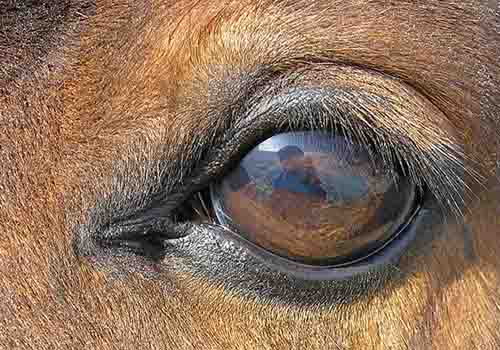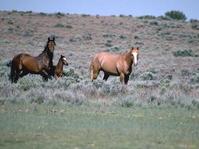 | ||||
Long-term & Sequential Memory
of Horses
from Science Prof Online
By developing a little horse sense, equestrians can build a stronger bond with their animal, be more effective in training, and better ensure the safety of both horse and rider.
Horses are Adapted for Memory
Horses have excellent long-term memory, an adaptation required by ancestral horses that often roamed and grazed over large territories. For enthusiasts, the horses capacity to learn and remember has practical applications for training and safety.
Article Summary: Part of developing a relationship with your horse requires getting inside its head, becoming a bit of a steed psychologist. Here's how horse memory works.
How a Horse's Learning and Memory Impacts Training
 | ||||||
You have free access to a large collection of materials used in a college-level introductory Cell Biology Course. The Virtual Cell Biology Classroom provides a wide range of free educational resources including Power Point Lectures, Study Guides, Review Questions and Practice Test Questions.
SPO VIRTUAL CLASSROOMS
 | ||||||
 | ||||||
SPO is a FREE science education website. Donations are key in helping us provide this resource with fewer ads.
Please help!
(This donation link uses PayPal on a secure connection.)
Page last updated 9/2017
Does your horse become skittish in a location where it previously had a frightening experience? Horses are prey animals, and, in the wild, if an attack occurred at a certain site, the ability to form long-term memories enables the herd to avoid that spot in the future. Horse memory is very practical, and that's something equestrians can put to work in training and building a relationship with their horses.
Horse Memory & Training
Scientific tests of equine psychology reveal extraordinary powers of memory and an ability to learn by trial and error. Consistency and repetition in training contribute to the development of a behavior pattern, and ultimately a habit. In training a horse, favorable habits are what the trainer is attempting to establish.
It is important to make sure that your horse is at ease when you are trying to teach it something. An animal will learn very little when under stress, except perhaps to try and avoid that situation in the future. Stress, panic and perceived threat can make learning nearly impossible for your horse. Each horse is different; some laid back, some high strung; so be sure not to rush training or train at an inopportune time.
When training, do not constantly correct or interrupt your horse's thought process. Horses are sequential thinkers, and a task that requires deep concentration will never be learned and established in memory if the animal can't focus.
Ultimately, a horse that has been well trained never forgets its training, nor does a poorly trained one. This is why it is so important to recognize and correct unwanted behaviors before they become bad habits.
A Memory for Mischief
Horses are smart and energetic animals that require mental and physical activity. Idle, bored horses will look for something to do, and this can often lead to trouble, such as opened gate latches, leads untied from posts, and grain bins opened. Once these mischievous masters of memory succeed, they are automatically reinforced by the innate reward of each activity, and the combination of boredom, good memory and inadvertent reward leads to bad horse habits that are hard to break.
Building a Relationship with Your Horse
No Hard Feelings: Although horses remember well, they don't hold grudges, and neither should you. If a nip's directed at you, and you reprimand in return, once that exchange is over, it's all water under the bridge.
The handler is not going to hurt their horses feeling by establish control. A horse that puts up a fight is testing you. It's not personal. The animal is establishing boundaries; trying to see what it can get away with. Remember, horse herds have leaders. In the horse-handler relationship, you need to establish yourself as the leader. The horse will remember that you've earned its respect.
The Last Memory Lasts: As a sequential thinker, a horse will best remember the last event in a series, so always end your interaction on a positive note. That is what the horse will recall, and establishing positive memories will help you build a great long-term friendship with your horse.
Sources and Other Helpful Animal Behavior & Equestrian Links
- Waring, G.H. (2002). Horse Behavior, William-Andrews Inc.Bradley, M., Professor, Department of Animal Sciences, University of Missouri-Columbia.
- Animal Behavior Wikibook
- ASPCA: Ask the Expert - Horse Behavior
- Equisearch: Website for People Who Love Horses


